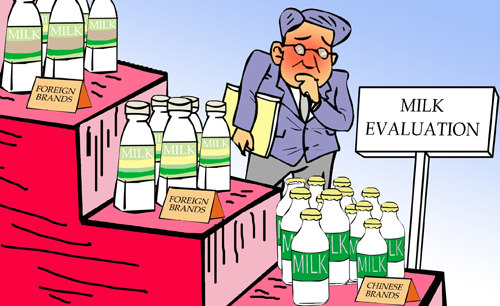|
 |
|
(LI SHIGONG) |
At a seminar of the dairy industry in June, Wang Dingmian, President of the Guangzhou Dairy Association, attacked China's current raw milk standard, saying the current standard is more relaxed and inefficient. He even said the current raw milk standard is the lowest in the world. However, Talmud, Secretary General of the Dairy Association of the Inner Mongolia Autonomous Region, said China's dairy industry was still in a preliminary stage of development and the current raw milk standard was based on national conditions. The controversy over the raw milk standard has made headlines across the country in recent days.
Maintain the current standard
Talmud (People's Daily): There is no doubt that dairy safety standards must put the public's health first. We have to admit China's current raw milk standard is not high at all. It demands protein content per 100 grams of raw milk stand at 2.8 grams or more, but the old standard was 2.95 grams. According to the old standard, the aerobic plate count allowed was 500,000 a milliliter, but now it is 2 million. The two indexes show the country's raw milk standard has significantly dropped.
However, the new standard is not harmful to people's health. The health departments have taken into consideration dairy safety before making the current standard. We all hope to see strict dairy safety standards for China's dairy industry, but the current situation in China is that most Chinese raw milk providers are still unable to meet a higher standard. In fact, 70 percent of dairy farms are running on a small scale, with fewer than 100 cows. Small-scale operation can't ensure stable quality and sanitation for raw milk. Moreover, the current milk supply falls far behind the demand for the dairy-processing industry, with a gap of 40 to 50 percent. In this situation, milk-processing companies are unable to impose too high standards on raw milk.
A raw milk standard has to conform to the reality of the country's dairy industry, and at the same time ensure consumers' health and safety. The priority of the industry now is to expand the farming scale to improve milk supply.
The idea to improve milk quality by raising the raw milk standard is great, but it will be a heavy blow to the dairy industry, because it does not take into account the reality of China's dairy industry. If we raise the standard, at least 70 percent of small-scale farms will have to throw their milk away, or kill their cows, leading to an even more limited supply line.
On one hand, we should be responsible for consumers' health; on the other hand, we have to respect the reality of China's dairy industry.
Wu Jiang (www.xinhuanet.com): Due to food safety scandals in China's dairy products in recent years, and the argument that a lower standard is not harmful to health inevitably arouse anger among the public. But the quality of dairy products mainly depends on raw milk and the processing technology. Therefore, the raw milk standard should be based on China's national conditions in the dairy industry. Most of China's dairy farms and manufacturers are now unable to reach higher standards. If the current standard is further raised, 70 percent of China's dairy farms will have to be shut down, and by then foreign dairy brands will dominate the Chinese market.
In fact, a stricter standard might make dairy producers take risks to violate laws, rather than upgrading the quality immediately. The melamine scandals of some dairy products show enterprises risk adding additives to milk to reach a certain higher standard. They are presently unable to improve milk quality in face of the present production situation. At least for the time being the raw milk standard should be set based on China's national conditions.
| 